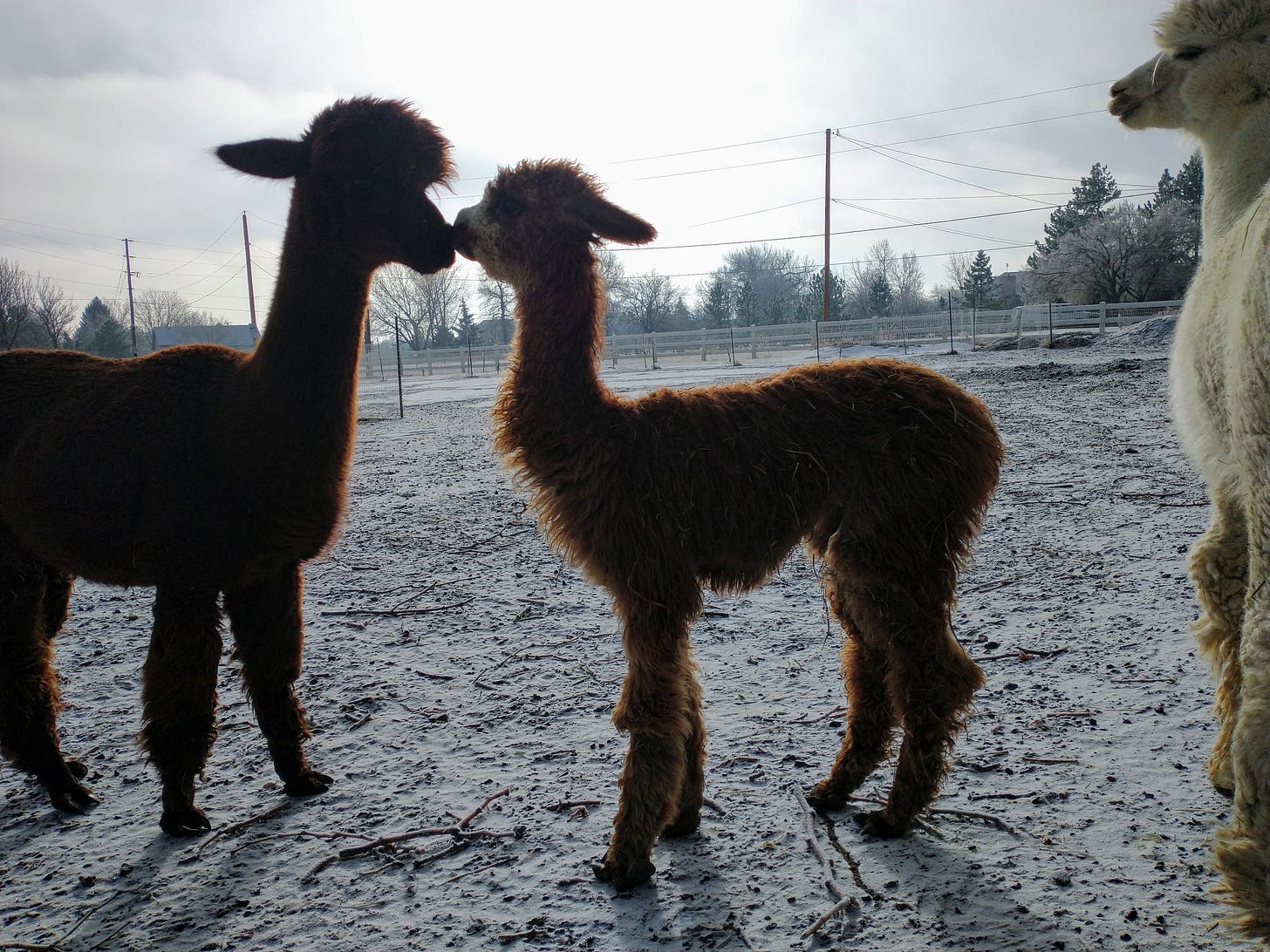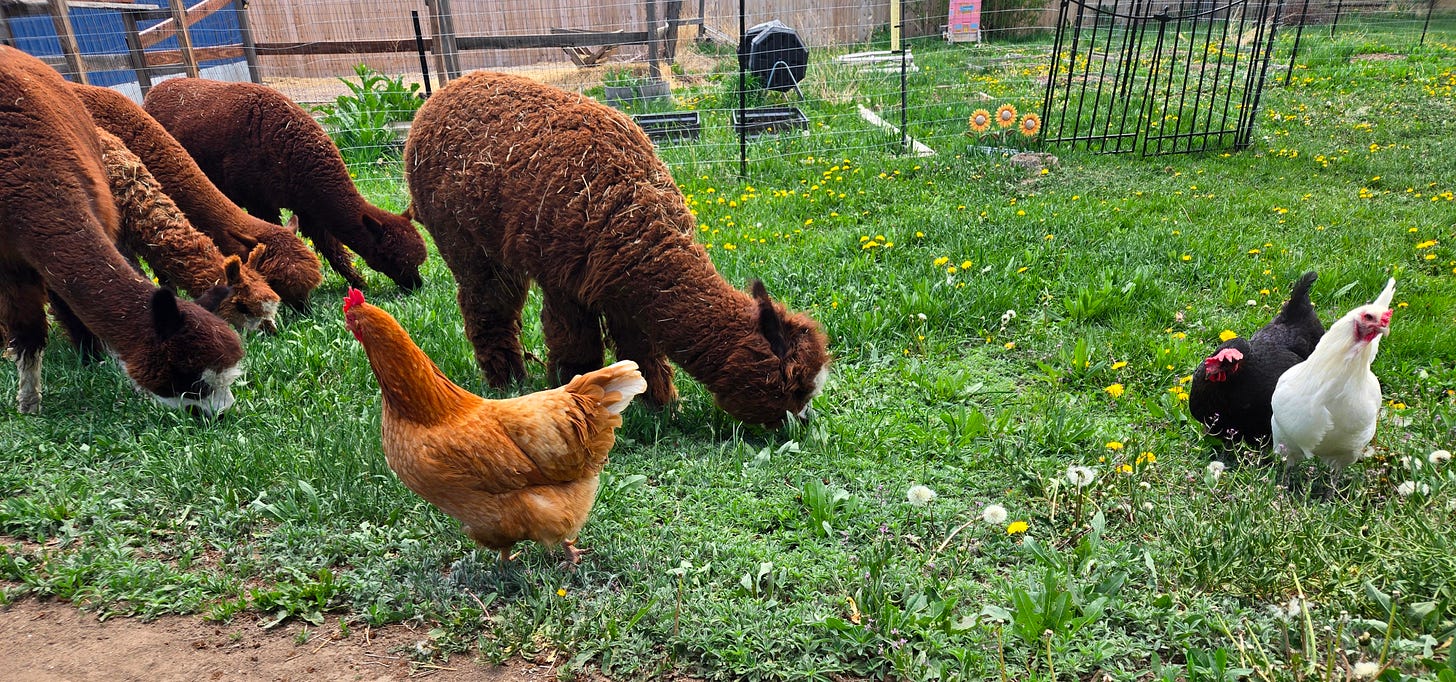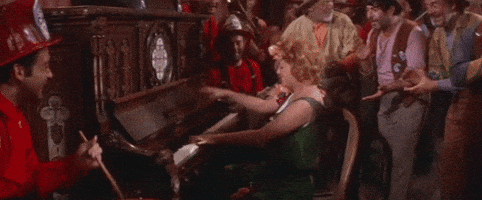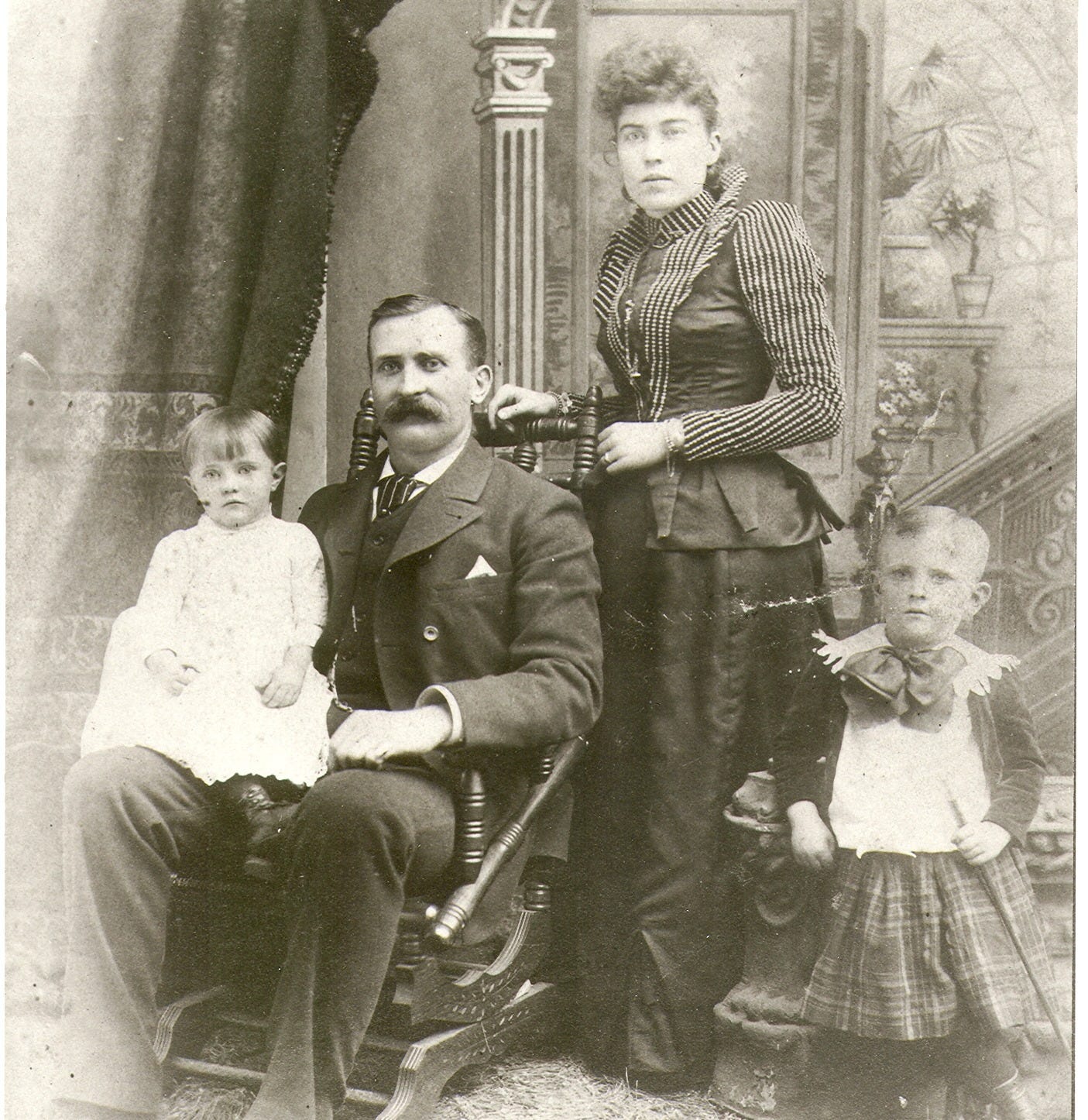Over the weekend, we had open hours for people to visit with the alpacas. It was Mother’s Day themed so people could learn about alpaca mamas, but because our herd is all-female, we generally end up talking about those relationships all the time anyway.
Alpaca Mamas
I think because our herd is small, the mothers and daughters in our care maintain closer contact for longer than they might on a bigger farm. For example, if there were more opportunities, Nell might drift away from Theodora around this time. She is starting to develop a little friendship with Luna; I often see them hanging out near each other in the pasture. But she also spends a lot of time with Theo and Clementine.
Alpacas are wonderful mothers who usually carry a single cria for an average of 50 weeks of gestation. They nurse their babies for 6-9 months and, unless there’s human intervention, their young stay pretty close to them for the first year-ish, before finding their own place in the herd as adolescents. It is a beautiful process to watch up close. Other alpacas help to socialize the young, and maiden aunts are often the most patient members with young crias.
We generally keep moms and babies in a separate stall together during the first week and then overnight for the first month to ensure nursing is well-established and there is not too much interference by nosy aunties. When Luna was a baby, Julio accidentally shut her in the stall overnight, not with her mother, Miss Firecracker, but with Clementine. When he let them out in the morning, Clementine sprinted away like, “I need a break from this kid!” Miss Firecracker wasn’t too pleased either, but everyone was otherwise okay.
Here are some of my favorite photos of our alpaca mothers and daughters. And a video. I think it’s funny that I tell the alpacas to be gentle with newborn Luna. I had been telling my toddler to be gentle a lot at the time.
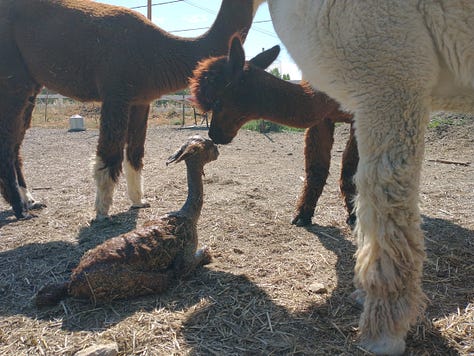


History has its eyes on you, and so do your kids.
During the open hours, a mother visited with her son and tween daughter. As we chatted, my chicken named Peggy wandered under the fence into the front yard. Although they stay close to the fence, it worries me when they do this. I normally chase them back, away from the danger of cars. As we visited with the alpacas, I noticed that Angelica had gone up front and was wandering home to the pasture with Peggy following behind.
“Oh, good,” I said, “Angelica went to get Peggy.”
"Wait…Angelica, Peggy, are your chickens?” the girl started to ask.
“Yes, they’re the Schuyler Sisters.” I explained that it was Julio’s idea.
I was kind of relieved that this young person liked our hens’ names, because I have been listening to Hamilton again recently and worrying that it had been relegated to Millennial fare. It’s just so good. It is also idealistic in a way that feels both comforting and challenging, but I wonder sometimes if it would be the hit it was if it were released in this moment.
One of the major themes of the musical is legacy. Hamilton, Burr, and Washington all sing about it several times. In “The World Was Wide Enough,” Hamilton says, “Legacy. What is a legacy? It's planting seeds in a garden you never get to see."
At first glance, Hamilton really leans on the Great Man theory of history, but as Phillipa Soo points out, although Eliza has fewer words than other main characters because she sings instead of rapping, in a musical obsessed with time, she gets more time than anyone else—as a person, if not on stage. In the end, she is the last one standing, redeeming her husband’s legacy, and telling his story. It gives me chills. So often, women are the unsung heroes of history.
This week wraps the legislative session here in Colorado, bringing to a close a season of advocacy that a couple of "moms groups” I am part of have been busy with. I love working with other women1 on these sorts of projects. It feeds my soul. Reflecting on how many bills we advocated for were signed into law (and on those that have not) and writing Mother’s Day cards to the women in my family has turned my mind toward the connections between motherhood and legacy.
When I give tours at the Molly Brown House, I invite guests to think about what legacy they want to leave behind. Having risen from working-class backgrounds to great wealth, Margaret and J.J. Brown thought a lot about their own legacies, but the story told about her in popular culture usually turns her into a caricature. She is depicted as a heroine of the Titanic, sure, but also as tacky and uneducated. That was simply not the case. Rarely do these stories tell of her philanthropy and activism. She was a staunch advocate for women’s suffrage, workers’ rights, and child welfare. She also had a complicated relationship with her own children. Nonetheless, they recounted thinking they had the most wonderful mother in Denver, and they were deeply upset by how her story was told after her death.
One of my favorite lines from Margaret also focuses on mothering and aging. In a 1914 interview about a potential run for U.S. Senate, she said:
Why should a woman be mildewed at forty? That is the best time to start a real career. Assuming she is a mother, her children are launched by that time; if a childless wife, she has probably mothered her husband’s activities to the point of success; if wage-earning and responsibility occupied her early years, she has won success, and can afford to take a breath and look around a little.
Granted, as I near forty, my daughter is still far from launch. The timeline for women in 1914 does not neatly line up with our moment, but I love Margaret’s refreshing take on moving into another phase in her life, and all the work and adventures yet ahead.
I think recent events have highlighted the connections between motherhood and politics that popular discourses about maternity often try to elide. Debates about a declining birthrate and how to encourage more people to have children have caused a lot of women to throw their hands up and say, “Whoa, whoa whoa! This ain’t it!” Often, the disagreement is not even about motherhood, but about how best we can or should support parents as a community. Discussions about a Universal Basic Income, parental leave, healthcare, gun violence, civil rights, and the environment also take up these threads, as they impact our homes.
I have often heard it said that the home is our first church. I think it should also be said that our home is our first lesson in civics. Pinkwashed, commercialized depictions of motherhood often give the appearance that the home is an apolitical sphere, but even that is a political stance. I do not mean partisan. I mean politics—the way we decide how to function as a community. Our kids are always watching us. Always listening. I was reminded of that when the dog got under my feet and I told her to go away. A little voice piped up from the other room, “We don’t say that here.”
One of the reasons we have our child in a Montessori school is the emphasis on peace education. Maria Montessori (that badass) wanted to change the world and decided that the best way to do it was truly grassroots—with early childhood education. She wrote:
Everyone talks about peace, but no one educates for peace. People educate for competition and this is the beginning of any war. When we educate to cooperate and be in solidarity with one another, that day we will be educating for peace.
My daughter’s school and her wonderful teachers really emphasize cooperation, taking care of common spaces and belongings, and respect for other persons alongside developing autonomy. It’s beautiful and I have learned so much from them.
But that’s just one philosophy. There are lots of small, everyday ways we can teach kids civics. How do you teach civics in your home? Please tell me.
Mother’s Day itself began as a protest against the violence of the Civil War and Franco-Prussian War. Although Woodrow Wilson made Mother's Day an official day of observance in 1914, the holiday has roots in the years after the Civil War. In 1870, Julia Ward Howe wrote the Mother's Day Proclamation:
Arise, then, women of this day!
Arise, all women who have hearts, Whether our baptism be of water or of tears!
Say firmly: "We will not have great questions decided by irrelevant agencies, Our husbands will not come to us, reeking with carnage, for caresses and applause. Our sons shall not be taken from us to unlearn All that we have been able to teach them of charity, mercy and patience. We, the women of one country, will be too tender of those of another country To allow our sons to be trained to injure theirs. (Source)
So, as you prepare for Mother’s Day perhaps take some time to think about the women in your lives who are teaching, gardening, caregiving, protesting, advocating, and loving. From your great-grandmother’s laugh to your daughter’s toes how has maternal legacy shaped your life and what is the legacy you hope to leave as a person? I would love to hear about it in the comments.
And our token Dads.



